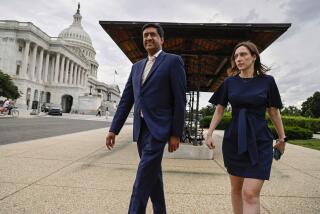COLUMN LEFT : Harkin Bets on the Wrong Party Base : The blue-collar Democrat is a fading breed; smart money is tapping high-tech anxieties.
- Share via
My grandmother (may she rest in peace) would have voted for Tom Harkin--but she’s dead, and therein may lie the answer to this year’s most important political question: Does the failure of Tom Harkin, self-anointed heir to the party of Roosevelt, Truman and Kennedy, to move above single digits in opinion polls in New Hampshire (or anywhere else, for that matter) mean that the old Democratic Party (may she rest in peace) is dead and gone or simply ailing?
When the senator from Iowa entered the race last fall, he was considered a serious contender. He was the favorite of organized labor, a tough, salty, plain-speaking populist. A campaign flyer contains the following message: “When I’m president, every double-breasting (sic), scab-hiring, union-busting employer will know that American working people have a friend in the White House.”
To emphasize his solidarity with working people, Harkin has spent large parts of his campaign days working at different jobs--going out on a lobster boat, laying sewer pipe, replacing a fire hydrant, being a waiter, a cop, a short-order cook and many more. A recent day at a sewage site in Manchester got Harkin on all the evening newscasts in blue jeans and a hard hat, hoisting cement block.
And that may be the problem. When New Hampshire’s economy was booming it was a high-tech economy. What the voters there know with more authority than voters in a lot of other states is that, however nostalgic we may be for an era in which an honest day’s work consisted of brawn, these days it’s brains that matter. Almost by definition, a job that can be done by a politician who walks in off the street is a job that doesn’t pay very well and will eventually disappear.
At the root of Harkin’s failure to take hold in the polls may lie the fact that the most visible portions of his campaign celebrate the dying, not the growing, portion of the American economy.
Intellectually, Harkin admits that jobs like the ones he has been doing are not the future of the American economy. He talks about high-tech, high-wage jobs and the importance of retraining the American work force. In fact, his next work day in New Hampshire was to be at a high-tech communications company. Nevertheless, the central economic message of his campaign is about building “this new America--roads, bridges and highways and freeways and mass transit.” He could be running for president of the building trades union; as New Hampshire Democratic leader Joseph Grandmaison points out, Harkin’s campaign has yet to say much to the computer engineer who has lost his job. The result is that, in the words of one New Hampshire voter, Harkin “strikes some older chords, something from the past.” Ironically, Arkansas Gov. Bill Clinton, who comes from a state so poor that it never had many high-tech jobs, is doing a better job connecting with the economic aspirations of New Hampshire voters; so are Sen. Bob Kerrey and former Sen. Paul Tsongas.
But if Harkin’s economic message is a throwback to the old Democratic base, his foreign policy is a repudiation of that base. The Democratic Party of Franklin Roosevelt, Harry Truman and John Kennedy was a party that did not shrink from the exercise of American power. Harkin, however, sides with the far left in the party, an opponent of American intervention almost anywhere in the world.
Harkin will probably do better in New Hampshire than the polls suggest. The party’s blue-collar base is shrinking, but it exists, and Harkin is its clearest advocate. But when the topic turns to foreign policy, that base will prove fickle indeed.
One year ago, the very first cars to sprout American flags on their antennas were not Volvos but the pickup trucks and TransAms of America’s blue-collar workers. These guys, with whom Harkin claims such great affinity, know better than most that when the mean guy in the bar starts knocking down chairs, you’d better knock him out fast before he actually hurts someone. Harkin didn’t seem to understand that about Saddam Hussein; Truman would have, Kennedy would have, even my grandmother would have.
More to Read
Get the L.A. Times Politics newsletter
Deeply reported insights into legislation, politics and policy from Sacramento, Washington and beyond. In your inbox twice per week.
You may occasionally receive promotional content from the Los Angeles Times.










